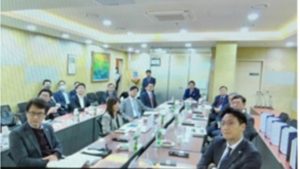Published on 7th December 2022
Collaboration has been a long-established practice for WEC’s national federation members in North-East Asia, and even the Covid pandemic could not stop it! For the past couple of years, JASSA, CAFST and KOHRSIA switched to virtual for their annual joint meeting. On 27 October 2022, about 70 people from the three associations met online for the 16th meeting of WEC’s North East Asia region.
“It is extremely valuable for the three federations to meet together regularly as a regional group. We discuss the current market trends, share best practices, and try to uncover some ways to solve the challenges that we are facing in our respective markets,” explains Shinya Yamamoto, Regional Representative from WEC’s North East Asia region. “”
The annual gathering is an opportunity for each association representing private employment services agencies in Japan, China and South Korea to share the latest labour market developments in their country and exchange best practices on how to address common regional challenges.
In Japan, the industry’s annual sales has been on an upward trends thanks to the “equal pay for equal work” system aiming for improving the remuneration of agency workers. Nevertheless, the industry is still suffering from the slow recovery in certain sectors such as tourism or sales, following the Covid-19 pandemic.
In China, the industry is challenged by restrictions on the reasons for use for agency workers. Growth is slowing down and many user companies has resorted to using outsourcing services instead, leading to rapid development of that segment.
In South Korea, the winds of change are blowing in various fields with the arrival of a new government. Addressing the new authorities, the industry submitted a proposal for the abolition of the two-year period and the limited tasks defined for agency workers.
Focus on re-skilling
In addition to these national developments, JASSA, CAFST and KOHRSIA also discussed the common issue of re-skilling. All three countries face serious challenges in this area, notably due to labour shortages in certain sectors and the impacts of digitalization.
In Japan, JASSA is hosting e-learning programs and online workshops and is also focusing on upbringing of talent with digital skills. In China, CAFST shared how the Government encourages enterprises to carry out vocational training through systems such as lifelong vocational training, large-scale vocational training and the development of workers’ education, with a large number of subsidies for enterprises. In Korea, a major issue is the lack of government’s policies for agency workers, causing a lack of investment into the education of those workers. While education and training strategies and policies for non-regular workers had been announced in 2018, nothing has been implemented so far.
Exchanges of best practices is one of the most praised added value of the membership to the World Employment Confederation by its members. Discussions at regional level such as the annual gathering of the North East Asia members are complementary to those happening regularly at global level through the events organised by the WEC Head Office.
 |
 |
 |